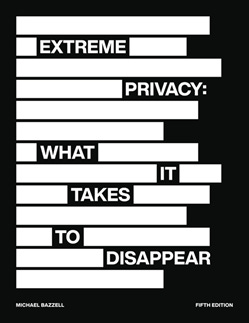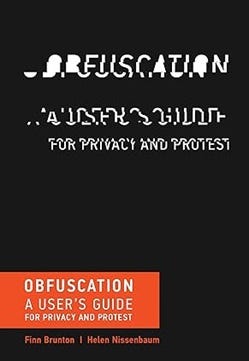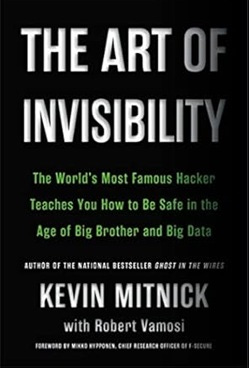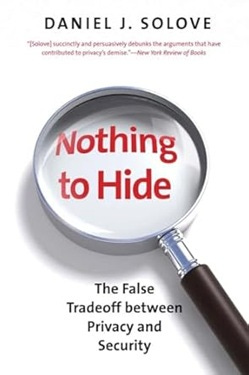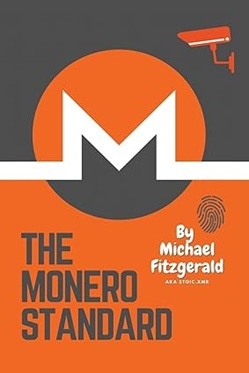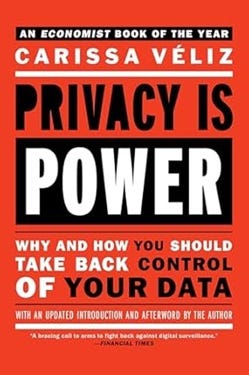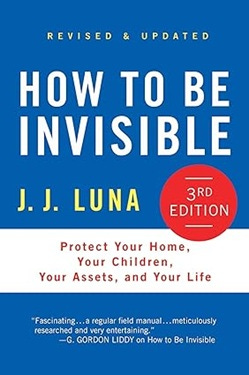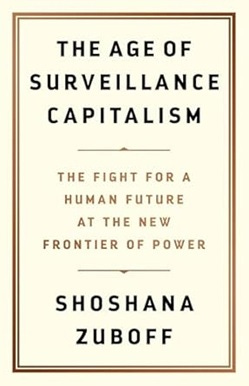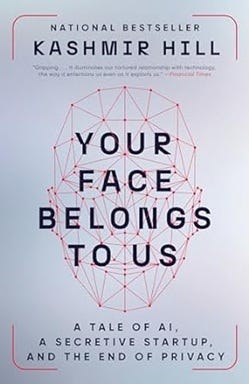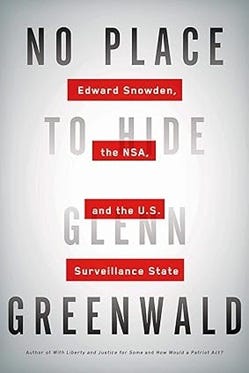Secrets of Privacy Bookshelf
Top Books On Personal Privacy and Information Security As of March 2025
Extreme Privacy | Obfuscation | The Art of Invisibility | Nothing to Hide | The Monero Standard | Privacy is Power | How to Be Invisible | The Age of Surveillance Capitalism | Your Face Belongs to Us | No Place to Hide
There are a number of great books that discuss digital privacy and information security at the individual level.
One problem is that this area is constantly changing, which means books quickly become outdated. That’s a large reason why we created our insider newsletter - it’s a better format for staying on top of the latest personal privacy and information security threats and solutions.
Still, some readers prefer books for at least getting started on their privacy and security improvement journey. Books excel at providing backstory, history and context - things that occurred in the past that set the table for what we face now. For those subscribers that this resonates with, we’ve carefully curated this list and will update it from time to time as new books become available.
Full disclosure: we included a “buy now” button for each book, which will take you to Amazon.com to purchase. If you purchase through our links, we receive a tiny commission as a member of their affiliate program. It helps us keep the lights on. No obligation to purchase through Amazon or even through our links. We get that some folks don’t like affiliate links and/or Amazon.
Extreme Privacy: What it Takes to Disappear
By Michael Bazzell
The gold standard book for DIY digital privacy and security. Extreme Privacy: What It Takes to Disappear is an incredibly comprehensive guide on how to protect your personal privacy in the digital age. The book covers techniques and strategies for removing your information from the internet, protecting your identity, and ensuring your digital footprint remains as small as possible. Bazzell discusses methods such as using secure communication tools, avoiding tracking, and taking legal steps to safeguard privacy. It also delves into the concept of "disappearing" entirely, exploring how to cut ties with modern technologies and live off the grid while remaining secure.
In general, the tactics in the book will be overkill for most readers. The primary use case is for celebrities, political activists and people with public or semi-public profiles that need to go under the radar. But readers serious about bolstering their privacy and security should consider having a copy on hand.
Obfuscation: A User’s Guide for Privacy and Protest
by Finn Brunton, and Dana Hickox
This book explores the use of obfuscation (i.e. deception) as a tool for privacy protection and protest against pervasive digital surveillance. In the personal privacy and information security contexts, obfuscation involves adding ambiguous, confusing, or misleading information to interfere with data collection, something we’ve touched on before in our newsletter (see here).
The authors propose it as a complementary strategy to other privacy measures, particularly useful for those lacking the power to control their data effectively. They outline six primary goals for obfuscation projects, including:
buying time
providing cover
achieving deniability
preventing individual exposure
interfering with profiling
expressing protest
The book provides historical and contemporary examples of obfuscation, such as radar chaff in World War II and software that camouflages search queries. It discusses ethical considerations and practical implementations, emphasizing that obfuscation can be justified as a means to resist domination by stronger entities. By offering a practical guide to using obfuscation, the authors empower individuals to take proactive steps in protecting their privacy in our hyper surveilled age.
The Art of Invisibility: The World’s Most Famous Hacker Teaches You How to Be Safe In the Age of Big Brother and Big Data
by Kevin Mitnick
The Art of Invisibility by Kevin Mitnick is thorough guide to protecting online privacy and security in an era dominated by surveillance and data collection.
As a former hacker turned security consultant, Mitnick shares practical strategies for achieving online anonymity, emphasizing the importance of strong passwords, encryption, and secure communication methods. The book is divided into two main parts: the first focuses on securing personal online life, covering topics like password security, safe use of public Wi-Fi, and protecting online banking. The second part delves into more advanced techniques for becoming "invisible" online, using real-life examples to illustrate the risks and challenges of maintaining privacy in a digital world.
Mitnick's approach is both informative and cautionary, highlighting the pervasive nature of digital surveillance and the ease with which personal data can be compromised. He discusses historical hacks and his own experiences to underscore the vulnerabilities of modern technology. While some strategies may seem extreme for average users, the book provides valuable insights into digital risks and offers actionable advice for enhancing security. By equipping readers with the knowledge to protect their personal information, "The Art of Invisibility" serves as a practical resource for navigating the complexities of online privacy in the age of Big Data.
We like that the author has hands on experience and isn’t a reporter or journalist. This adds credibility to the author’s solutions.
Nothing to Hide: The False Tradeoff Between Privacy and Security
by Daniel J. Solove
Nothing to Hide: The False Tradeoff Between Privacy and Security by Daniel J. Solove challenges the common argument that if you have nothing to hide, you should not worry about privacy. Solove argues that this perspective is flawed, as it narrowly focuses on the disclosure of personal information and ignores other privacy issues, such as the chilling effect on free speech and the potential for misuse of data by governments or other entities. The book critiques various pro-security arguments, including the "nothing-to-hide" argument, the "Luddite Argument," and others, which often skew the debate to favor security over privacy.
Solove emphasizes that privacy is a crucial social value that should be integrated into national security policy rather than being seen as a tradeoff against it. He discusses legal and technological issues, such as the Fourth Amendment, electronic surveillance, and government data mining, to illustrate how privacy can be protected without compromising security. By debunking the notion that privacy and security are mutually exclusive, Solove advocates for a balanced approach that includes adequate oversight and regulation to safeguard both values.
The Monero Standard: We’re Not Here for the Income We’re Here for the Outcome
by Michael Fitzgerald
The modern financial system is not structured to preserve or promote privacy. It seems safe to say that’s not controversial or a “deep” thought given how most financial transactions now are digital and are tracked, dissected and themselves monetized.
The Monero Standard: We’re Not Here for the Income We’re Here for the Outcome by Michael Fitzgerald explores how Monero, a privacy-focused cryptocurrency, can provide an alternate financial platform for freedom and prosperity. The book critiques the current fiat monetary system, arguing that it allows a small minority of global elites to control and influence various aspects of life. Fitzgerald posits that Monero offers a powerful alternative, enabling individuals to opt into a more secure and private form of money that can fundamentally change societal dynamics.
Fitzgerald emphasizes that traditional methods of protest, such as voting, may not be effective in challenging the status quo. Instead, he advocates for adopting Monero as a means to create a more equitable financial system. The book highlights Monero's privacy features and how they can help individuals maintain financial autonomy in a surveillance-driven world. By focusing on the potential of Monero to reshape global financial systems and promote individual freedom, Fitzgerald presents a compelling case for why this cryptocurrency could be a key tool in achieving broader societal change.
See our previous writing on Monero and privacy coins here.
Privacy is Power: Why and How You Should Take back Control of Your Data
by Carissa Veliz
In the digital age, personal data has become a powerful tool for control, exploited by tech companies and governments to erode individual autonomy and undermine democracy. Carissa Véliz argues in Privacy is Power: Why and How You Should Take back Control of Your Data that privacy is essential for maintaining free choice and a healthy democratic society, challenging the common notion that privacy is only for those with something to hide. She highlights how surveillance capitalism exploits personal information for profit and influence, creating significant power imbalances between corporations and individuals. This pervasive collection and exploitation of data threaten the very foundations of society by manipulating public opinion and influencing political outcomes.
Véliz advocates for reclaiming control over personal data as a collective effort, emphasizing that privacy is both a personal right and a civic duty. She debunks myths surrounding privacy, such as the idea that "I have nothing to hide," and argues that privacy is crucial for protecting democracy from manipulation by powerful entities. Véliz offers practical solutions for individuals and policymakers to take back control of their data, including adopting privacy-friendly alternatives to major tech platforms and pushing for stronger regulations on the data economy. By framing privacy as a form of power, Véliz provides a compelling case for why protecting it is essential for individual freedom and societal well-being.
How to Be Invisible: Protect Your Home, Your Children Your Assets and Your Life
by J.J. Luna
"How to Be Invisible: Protect Your Home, Your Children, Your Assets, and Your Life" by J.J. Luna is a guide to achieving personal security and privacy in an era where information gathering has become increasingly sophisticated.
Luna, a seasoned security consultant, shares practical strategies for safeguarding personal information and assets, drawing from his own experiences and real-life stories. He emphasizes the importance of decoupling personal identities from physical locations, using techniques such as "ghost addresses" and limited liability companies to protect ownership of assets. Luna also provides advice on low-profile banking, invisible money transfers, and running secret home-based businesses, all aimed at minimizing exposure to unwanted scrutiny.
The book offers a step-by-step approach to building personal security, addressing concerns from casual surveillance to more serious threats like stalking or financial exploitation. Luna discusses the dangers posed by modern technologies such as Facebook, smartphones, and facial recognition. He offers solutions like using pagers with dumbphones and locating trustworthy nominees for proxy services, which are probably too far for most, but worth considering.
While some methods may require significant lifestyle adjustments, the book serves as a valuable resource for those seeking to enhance their privacy and security.
The Age of Surveillance Capitalism: The Fight for a Human Future at the New Frontier of Power
by Shoshana Zuboff
In The Age of Surveillance Capitalism, Shoshana Zuboff delves into the implications of a new economic order that exploits human experience for profit. This system, which she terms surveillance capitalism, involves the unregulated (or at least lightly regulated) collection and manipulation of personal data to predict and shape behavior. Tech giants like Google and Facebook are at the forefront of this phenomenon, using advanced algorithms to create "prediction products" that are traded in "behavioral futures markets." These markets enable companies to anticipate and influence consumer actions, often without users' knowledge or consent, leading to a significant erosion of personal autonomy and democratic values.
Zuboff argues that surveillance capitalism represents a dangerous shift from traditional capitalist structures, as it seeks to control not just markets but human behavior itself. This new form of power, which she calls "instrumentarian," threatens democracy by creating a "Big Other" that operates beyond democratic oversight. Zuboff emphasizes that the unchecked growth of surveillance capitalism could lead to a dystopian future where human freedom is severely curtailed. She advocates for collective action and regulatory reforms to protect society from the pervasive influence of surveillance capitalism, which, if unchecked, could fundamentally alter the course of human history by prioritizing profit over individual rights and freedoms.
Your Face Belongs to Us
by Kashmir Hill
Kashmir Hill's latest work delves into the world of facial recognition technology, focusing on Clearview AI, a company that has amassed a staggering database of over 40 billion images scraped from the internet.
This technology allows law enforcement and other entities to identify individuals with remarkable accuracy, often without their consent. Hill's investigation reveals how Clearview AI's founders, Hoan Ton-That and Richard Schwartz manage to push their product into the mainstream. Despite Google and Facebook's hesitation to release similar tools, Clearview AI has become a powerful force in surveillance, raising serious concerns about privacy and civil liberties.
Hill's narrative is gripping and informative, tracing the history of facial recognition from its roots in eugenics to its current role in wrongful arrests and mass surveillance. She argues that this technology threatens to end privacy as we know it, creating a dystopian future where anonymity is a luxury of the past. By exploring the social, political, and technological forces behind Clearview AI, Hill argues for why she believes regulation is crucial to prevent the misuse of facial recognition technology.
No Place to Hide: Edward Snowden, the NSA, and the U.S. Surveillance State
By Glenn Greenwald
In No Place to Hide, Glenn Greenwald recounts his pivotal role in exposing the NSA's extensive surveillance programs through documents leaked by Edward Snowden. The book begins with Greenwald's initial contact with Snowden, an anonymous source who revealed himself in Hong Kong, and details the high-stakes process of verifying and publishing the sensitive information. Greenwald's narrative is both a personal account of his experiences and a broader critique of the U.S. surveillance state, highlighting how the NSA's goal to "collect it all" undermines civil liberties and privacy worldwide.
Greenwald's work not only chronicles the Snowden revelations but also contextualizes them within a broader discussion on surveillance and privacy. He argues that the NSA's actions, including programs like PRISM and X-KEYSCORE, represent a systemic overreach that threatens democratic values. By sharing Snowden's documents and detailing the NSA's collaboration with tech companies, Greenwald argues for the urgent need for transparency and oversight in government surveillance.
Ready to go deeper and become a harder target for AI scams, data harvesters and doxxers?
If you haven’t signed up yet to our insider newsletter, join 1K+ subscribers in the growing Secrets of Privacy community and get our weekly newsletter delivered to your inbox by subscribing here 👇
And follow us on X and LinkedIn for updates on this topic and other internet privacy related topics. We’re also now on Rumble and YouTube. Subscribe today to be notified when videos are published.


